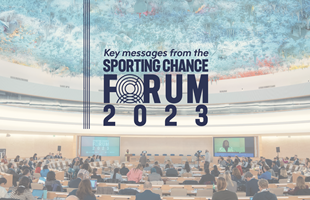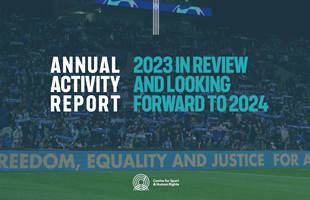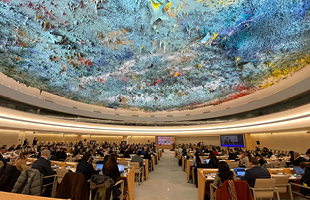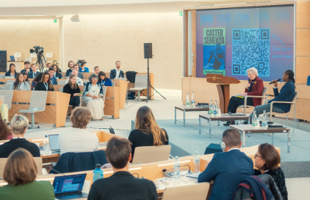Mary Robinson Closes 2019 Sporting Chance Forum
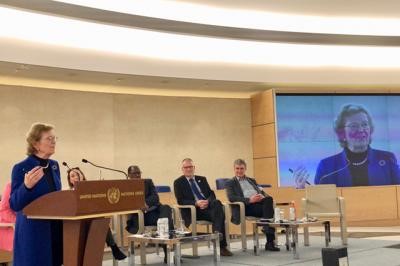
The Sporting Chance Forum, held on 21st and 22nd November in Geneva in the historic Room XX of the UN Palais des Nations, serves as a powerful opportunity to discuss the key human rights issues, and their solutions, that exist across the world of sport.
Hosted by The Centre for Sport and Human Rights, International Labour Organization, Office of the UN High Commissioner for Human Rights, and UN Office in Geneva, the programme explored how different actors in the world of sport can use their individual and collective leverage to achieve a world of sport that fully respects human rights.
Closing the Forum's two days of discussion was Mary Robinson, Chair of the Centre for Sport and Human Rights, who passionately reminded the 300+ leaders attending from across the sport and human rights communities why we must continue to build bridges and deepen relationships to address ongoing threats to human rights around the world.
Good afternoon everyone. It is a great pleasure to see so many colleagues and friends as well as many new faces at this year’s Sporting Chance Forum.
I regret that I couldn’t be here yesterday. I’ve been impressed by the quality of today’s sessions, and I’m pleased that we gave special priority to issues of child rights and safeguarding children, especially as we mark this week the 30th anniversary of the Convention on the Rights of the Child.
Under Mary Harvey’s leadership, the Centre team has taken important steps to prioritise children as a key constituency in our developing work. I welcome the efforts to involve UN child rights experts, sports bodies, governments and others on the panels earlier today as well as the outreach to include youth perspectives in the Forum’s discussions this year (something we committed to doing when we met in Paris). I know you are committed to building on this approach in the time ahead and I urge all here to make the rights of children - in particular the many involved in sport - a central priority of our individual and collective efforts as we move forward.
Let me say as well how pleased I was that we were able to hear directly today from the perspective of athletes through the conversation between Hakeem Al Araibi and Craig Foster. Such stories are powerful reminders of why the sport and human rights communities need each other and why we must continue to build bridges and deepen relationships to address ongoing threats to human rights around the world.
We all recognise that the global situation we face today is dangerous on multiple levels - growing authoritarian impulses by some government leaders, shrinking space for civil society in many countries, grave threats against brave women and men who defend human rights in their communities, ongoing discrimination and intolerance against migrants and others perceived as “outsiders” as well as growing impacts of the climate crisis that threaten the lives of millions today and many more in the years to come.
These challenges should of course leave little doubt that we need government leadership at every level. The previous session and its focus on the important role of States and regional bodies in advancing the human rights and sustainable development agendas highlight where progress can be made. The initiative by the Swiss government to bring together governments that host major sporting events to share lessons learned and agree good practices is also a noteworthy step in the right direction.
As I often say, quoting Desmond Tutu - I am a prisoner of hope. I truly believe that in the midst of our current chaos, we have opportunities for great creativity as we’ve seen at this Forum. We can decide to reform and reimagine governance at every level, and find new and better ways of working together to solve the many problems we face. Working together - “collective action for good” - that is why we’re all here.
As I said last year when we met in Paris, there is undoubtedly a huge opportunity to advance the human rights agenda through sport. We need to use every tool we have available to convey the importance of human rights, especially to young people. And I’m convinced that this Forum and all of your work individually and collectively can do just that.
But we know as well that there is much still to be done to match the inspiration of sport with reality. Sport organisations that commit to positive action need our support to undertake needed reforms, to build their own human rights capacities and to take full responsibility for societal impacts. I’m pleased that so many more representatives of sports bodies participated in this year’s Forum. That is an encouraging sign of their interest and willingness to learn and collaborate that we must build on in the years ahead.
I’ve been honoured to serve as the first Chair of the Centre - an independent human rights organisation within the world of sport - committed to working with all stakeholders to promote respect for human rights. I’ll be stepping down from this role when a new Chair is appointed next year but trust that I’ll be remaining involved wherever I can in helping advance our collective mission.
Allow me to say thank you to all involved for the important work that has been achieved since the Centre officially launched in June of last year. I’m truly impressed by the ambitious aims we’ve set for ourselves and by the growing multi-stakeholder coalition that is supporting the Centre through its Advisory Council. I know we all value the fact that the Centre is an independent organisation, and is committed to providing a safe space for constructive and respectful dialogue and joint action focused on people who are affected by sport most directly, including athletes, children, workers, fans and communities. Let’s build on that spirit and that mission.
Let me conclude by saying what I expect of all of you. I urge you to remain committed - to continue to find strength in the broad and diverse coalition that has come together to address complex challenges in the world of sport. We have all seen the positive change that can happen through collective action, and that will only be possible with your continued support of the Centre. To those in the audience who perhaps are attending a Sporting Chance Forum for the first time, I urge you to consider how your organisations may be able to support the Centre, and indeed, how the Centre may be able to support you as we move forward. Together, I’m convinced we can fully harness the power of sport to advance human rights for all.
Thank you.
